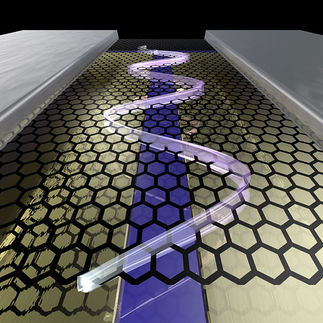New research shows how light can control electrical properties of graphene
New research shows how light can be used to control the electrical properties of graphene, paving the way for graphene-based optoelectronic devices and highly sensitive sensors.
This year's Nobel Prize for Physics was awarded for research into graphene, recognising its potential for many applications in modern life, from high-speed electronics to touchscreen technology. The UK's National Physical Laboratory, along with a team of international scientists, have further developed our understanding of graphene by showing that when this remarkable material is combined with particular polymers, its electrical properties can be precisely controlled by light and exploited in a new generation of optoelectronic devices. The polymers keep memory of light and therefore the graphene device retains its modified properties until the memory is erased by heating.
Light-modified graphene chips have already been used at NPL in ultra-precision experiments to measure the quantum of the electrical resistance.
In the future, similar polymers could be used to effectively 'translate' information from their surroundings and influence how graphene behaves. This effect could be exploited to develop robust reliable sensors for smoke, poisonous gases, or any targeted molecule.
Graphene is an extraordinary two-dimensional material made of a single atomic layer of carbon atoms. It is the thinnest material known to man, and yet is one of the strongest ever tested.
Graphene does not have volume, only surface – its entire structure is exposed to its environment, and responds to any molecule that touches it. This makes it in principle a very exciting material for super-sensors capable of detecting single molecules of toxic gases. Polymers can make graphene respond to specific molecules and ignore all others at the same time, which also protects it from contamination.
The research team included scientists from the National Physical Laboratory (UK), Chalmers University of Technology (Sweden), University of Copenhagen (Denmark), University of California Berkeley (USA), Linköping University (Sweden) and Lancaster University (UK).
Original publication
Most read news
Other news from the department science

Get the chemical industry in your inbox
By submitting this form you agree that LUMITOS AG will send you the newsletter(s) selected above by email. Your data will not be passed on to third parties. Your data will be stored and processed in accordance with our data protection regulations. LUMITOS may contact you by email for the purpose of advertising or market and opinion surveys. You can revoke your consent at any time without giving reasons to LUMITOS AG, Ernst-Augustin-Str. 2, 12489 Berlin, Germany or by e-mail at revoke@lumitos.com with effect for the future. In addition, each email contains a link to unsubscribe from the corresponding newsletter.




























































